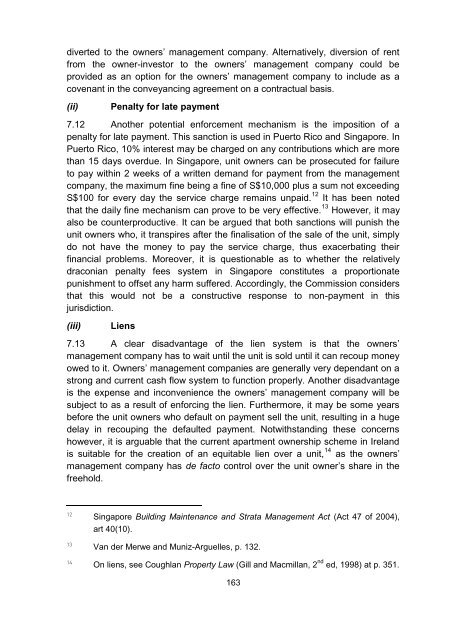Report on Multi-Unit Developments - Law Reform Commission
Report on Multi-Unit Developments - Law Reform Commission
Report on Multi-Unit Developments - Law Reform Commission
Create successful ePaper yourself
Turn your PDF publications into a flip-book with our unique Google optimized e-Paper software.
diverted to the owners‘ management company. Alternatively, diversi<strong>on</strong> of rent<br />
from the owner-investor to the owners‘ management company could be<br />
provided as an opti<strong>on</strong> for the owners‘ management company to include as a<br />
covenant in the c<strong>on</strong>veyancing agreement <strong>on</strong> a c<strong>on</strong>tractual basis.<br />
(ii)<br />
Penalty for late payment<br />
7.12 Another potential enforcement mechanism is the impositi<strong>on</strong> of a<br />
penalty for late payment. This sancti<strong>on</strong> is used in Puerto Rico and Singapore. In<br />
Puerto Rico, 10% interest may be charged <strong>on</strong> any c<strong>on</strong>tributi<strong>on</strong>s which are more<br />
than 15 days overdue. In Singapore, unit owners can be prosecuted for failure<br />
to pay within 2 weeks of a written demand for payment from the management<br />
company, the maximum fine being a fine of S$10,000 plus a sum not exceeding<br />
S$100 for every day the service charge remains unpaid. 12 It has been noted<br />
that the daily fine mechanism can prove to be very effective. 13 However, it may<br />
also be counterproductive. It can be argued that both sancti<strong>on</strong>s will punish the<br />
unit owners who, it transpires after the finalisati<strong>on</strong> of the sale of the unit, simply<br />
do not have the m<strong>on</strong>ey to pay the service charge, thus exacerbating their<br />
financial problems. Moreover, it is questi<strong>on</strong>able as to whether the relatively<br />
drac<strong>on</strong>ian penalty fees system in Singapore c<strong>on</strong>stitutes a proporti<strong>on</strong>ate<br />
punishment to offset any harm suffered. Accordingly, the Commissi<strong>on</strong> c<strong>on</strong>siders<br />
that this would not be a c<strong>on</strong>structive resp<strong>on</strong>se to n<strong>on</strong>-payment in this<br />
jurisdicti<strong>on</strong>.<br />
(iii)<br />
Liens<br />
7.13 A clear disadvantage of the lien system is that the owners‘<br />
management company has to wait until the unit is sold until it can recoup m<strong>on</strong>ey<br />
owed to it. Owners‘ management companies are generally very dependant <strong>on</strong> a<br />
str<strong>on</strong>g and current cash flow system to functi<strong>on</strong> properly. Another disadvantage<br />
is the expense and inc<strong>on</strong>venience the owners‘ management company will be<br />
subject to as a result of enforcing the lien. Furthermore, it may be some years<br />
before the unit owners who default <strong>on</strong> payment sell the unit, resulting in a huge<br />
delay in recouping the defaulted payment. Notwithstanding these c<strong>on</strong>cerns<br />
however, it is arguable that the current apartment ownership scheme in Ireland<br />
is suitable for the creati<strong>on</strong> of an equitable lien over a unit, 14 as the owners‘<br />
management company has de facto c<strong>on</strong>trol over the unit owner‘s share in the<br />
freehold.<br />
12<br />
Singapore Building Maintenance and Strata Management Act (Act 47 of 2004),<br />
art 40(10).<br />
13<br />
Van der Merwe and Muniz-Arguelles, p. 132.<br />
14<br />
On liens, see Coughlan Property <strong>Law</strong> (Gill and Macmillan, 2 nd ed, 1998) at p. 351.<br />
163

















